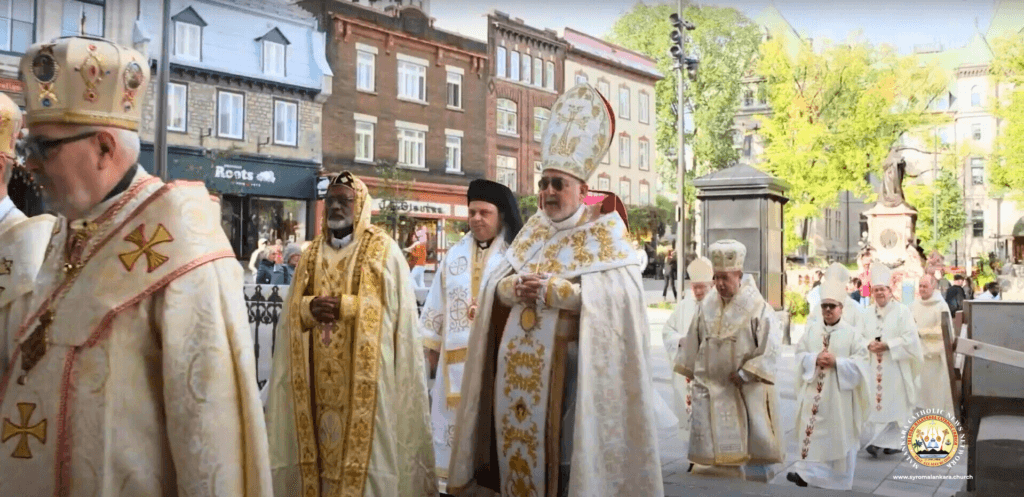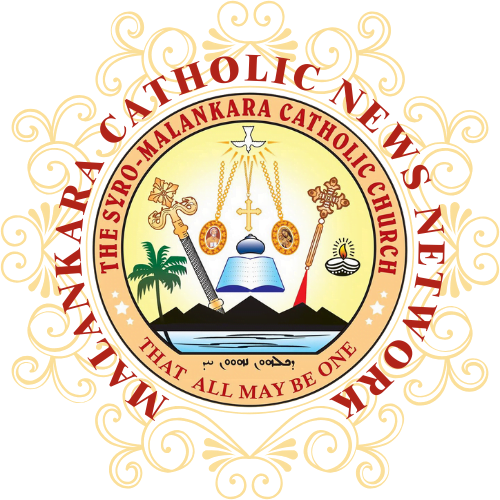His Excellency, Most Rev. Dr. Philipos Mor Stephanos, the Eparchial Bishop of the Syro-Malankara Catholic Eparchy in North America, attended the highly anticipated Plenary Assembly of the Canadian Conference of Catholic Bishops (CCCB) held from September 23rd to 27th, 2024, in Beaupré, Quebec. The assembly brought together 79 bishops from across Canada’s Latin and Eastern Churches to discuss pressing issues affecting the Church and society, with a particular focus on justice, peace, and synodality.
The Plenary Assembly is the highest body of authority within the CCCB, gathering annually to deliberate on key themes impacting the life of the Church in Canada. This year’s assembly coincided with the 350th anniversary of the establishment of the Archdiocese of Quebec, adding a historic dimension to the gathering. The bishops also looked ahead to the Jubilee Year of Hope in 2025 and the second session of the Synod on Synodality in Rome.
Key Topics of Discussion
1. Migrants and Refugees: The Episcopal Commission for Justice and Peace led an important discussion on the global and local challenges faced by migrants and refugees. The session featured insights from Fr. Fabio Baggio, Undersecretary of the Dicastery for Promoting Integral Human Development, and Ms. Alessandra Santopadre from the Archdiocese of Montreal. The discussion centered on the Church’s role in advocating for the rights and dignity of displaced individuals, a topic close to Bishop Mor Stephanos, given his pastoral involvement in immigrant communities.
2. Development and Peace—Caritas Canada (DPCC): An update on the activities of Development and Peace—Caritas Canada was presented by DPCC’s National Council members, including Mrs. Brenda Arakaza, President, and Mr. Carl Hétu, Executive Director. The session focused on Caritas Canada’s efforts in addressing poverty and injustice through development projects, aligning with Pope Francis’s call for a “Church of the poor.” The organization highlighted its work in various global regions, where it supports vulnerable communities.
3. Safeguarding Minors and Vulnerable Persons: The Standing Committee for Responsible Ministry and the Protection of Minors and Vulnerable Persons presented new measures to review and enhance safeguarding protocols within dioceses and parishes. The Committee urged the bishops to continue their commitment to transparency and accountability, ensuring that the Church remains a safe space for all, especially minors and vulnerable groups.
4. Synod on Synodality: As the Church prepares for the XVI Ordinary General Assembly of the Synod of Bishops, synodality was a central theme of the Plenary Assembly. The bishops participated in small group discussions to reflect on the Canadian Church’s synodal journey, providing feedback to the Synod’s General Secretariat. Bishop Mor Stephanos, in his role as a delegate, contributed to these discussions, particularly focusing on the unique challenges faced by Eastern Catholic Churches in Canada.
The Synod process has been a collaborative effort to understand how the Church can better walk together as a synodal community. The bishops reviewed the local synodal experiences and explored how these insights could enrich the universal Church’s ongoing synodal reflections. His Eminence Mario Cardinal Grech, Secretary General of the Synod of Bishops, delivered a keynote address virtually, discussing the second session of the Synod scheduled in Rome.
Additional Highlights:
350th Anniversary of Quebec’s Archdiocese: This year’s Plenary Assembly coincided with the 350th anniversary of the establishment of the Archdiocese of Quebec. The bishops joined Cardinal Archbishop Gerald Lacroix in celebrating this historic milestone, which underscores the deep roots of Catholicism in North America.
Address by the Apostolic Nuncio: As per tradition, Archbishop Ivan Jurkovič, Apostolic Nuncio to Canada, addressed the assembly. His remarks echoed Pope Francis’s vision of a Church that is both outward-looking and grounded in social justice, with particular emphasis on the importance of walking alongside migrants, Indigenous peoples, and the marginalised.
Jubilee Year of Hope 2025: Looking forward, the assembly discussed preparations for the Jubilee Year of Hope in 2025. This year, focused on prayer and reflection, will commemorate key moments in the Church’s history and promote a renewed sense of evangelization. The bishops reviewed initiatives led by the Ad-hoc Committee for the Jubilee, including a webinar series on the Vatican II Constitutions and the spiritual significance of the Our Father.
Family and Life – Euthanasia and Palliative Care: The bishops addressed Canada’s ongoing debate over euthanasia and assisted suicide. The CCCB emphasized the importance of expanding palliative care services and strengthening advocacy against euthanasia. In collaboration with the Pontifical Academy for Life, the CCCB hosted an international symposium titled Towards a Narrative of Hope, focusing on palliative care and the need for a culture of compassion.
Indigenous Reconciliation Efforts: The bishops reflected on the second anniversary of Pope Francis’s penitential pilgrimage to Canada and the ongoing work of healing and reconciliation with Indigenous communities. Significant progress has been made through the Indigenous Reconciliation Fund, which supports initiatives aimed at fostering justice and healing. The CCCB continues to engage in dialogue with Indigenous leaders and other Catholic episcopal conferences to address common concerns.
Press Briefings and Synod Delegates:
The assembly included multiple press briefings, both formal and informal, to discuss the proceedings. Bishop Mor Stephanos, along with other delegates, participated in discussions about Canada’s contribution to the Synod of Bishops, with particular attention to the needs of the Eastern Catholic communities.
Conclusion: A Call for Unity and Evangelization
As the Plenary Assembly drew to a close, the bishops reaffirmed their commitment to building a Church that walks with the marginalised, safeguards the vulnerable, and stands united in faith. For Bishop Philipos Mor Stephanos, the gathering was an opportunity to represent the concerns of the Syro-Malankara Catholic faithful in Canada and to contribute to the broader discussion on synodality, migration, and evangelization.
This assembly not only set the stage for the Canadian Church’s participation in the Synod on Synodality but also provided a platform for the bishops to reaffirm their mission in a world facing both spiritual and social challenges.


